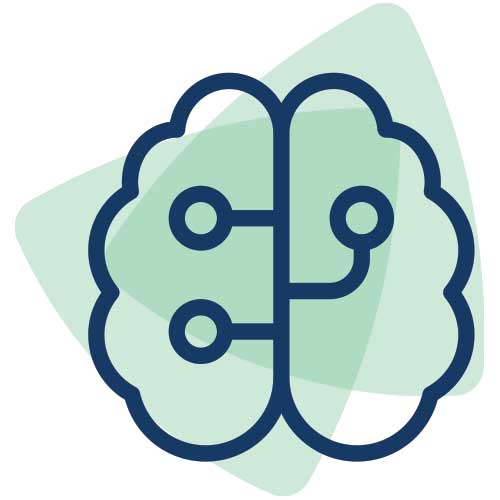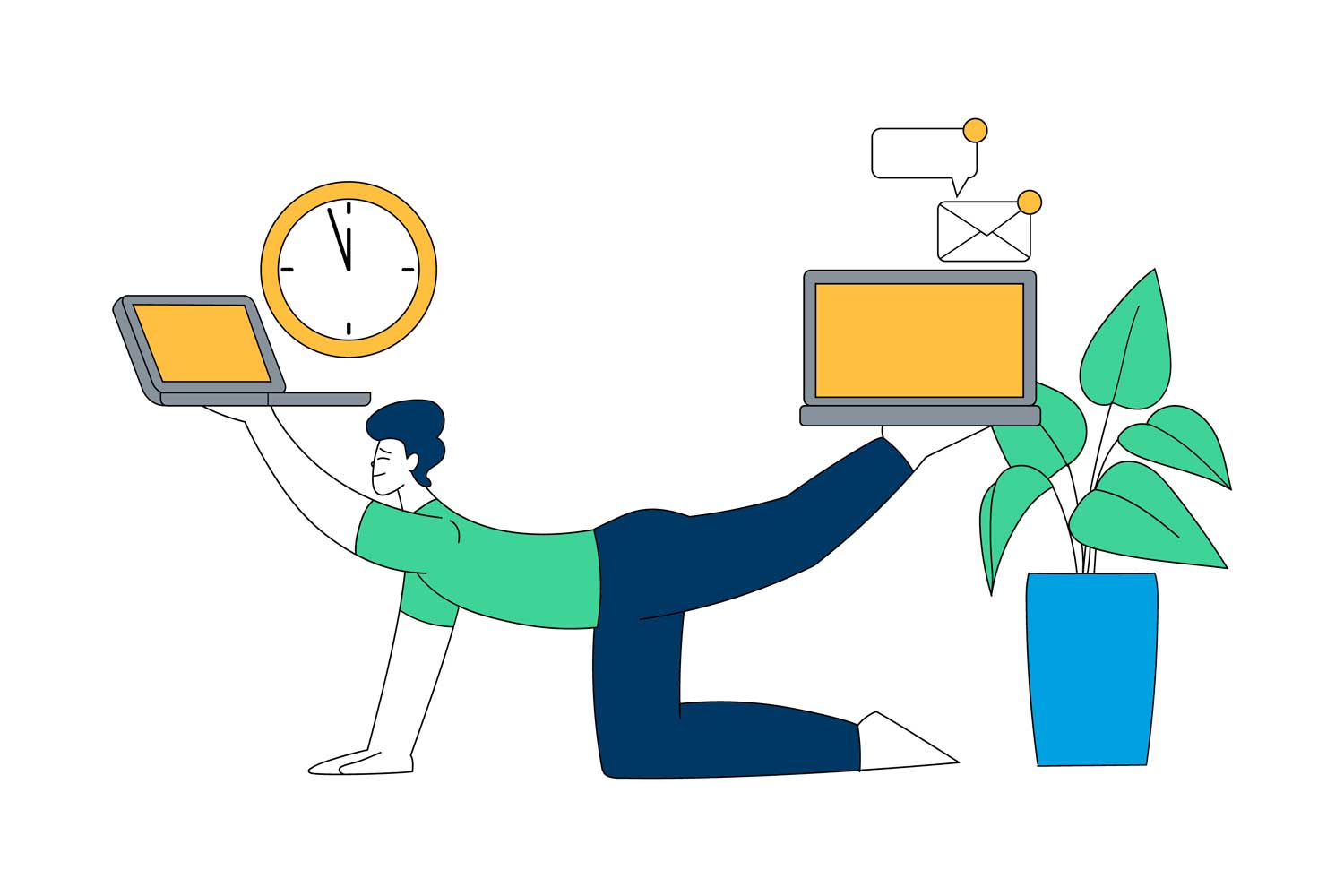Mental Health Conditions
Mental health covers a wide range of conditions, including anxiety and depression. It affects the way you think feel and behave, as well as how you process information when working and learning. Personalised assessments and coaching can help you find the recipe for learning and working your way. Here you can find some common questions on mental health conditions.
What is Mental Health?
Mental health is a term used to describe the wellbeing of our ‘mind’ including how we feel and think. Most people will think about depression and anxiety when they hear mental health, but there are many more mental health conditions that have been identified over the years. Researchers who study human brains and mental health think it is very unlikely that there is a ‘normal’ type of brain, but there are some common indicators of good mental health, like there are for good physical health (such as resting heart rate and blood pressure).


Indicators of our mental health can include:
- How we manage our emotions
- How much energy we have
- How we think about ourselves and other people
- How we interact with other people, and how regularly we do it
- How we behave in situations that are exciting, stressful or overwhelming
- How well we look after our bodies, including personal hygiene and exercise
- How easy we find it to learn and work
There are several health reasons or individual differences (like neurodivergence) why someone might have difficulty in one or more of these areas. That is why the expertise of people like doctors, nurses and other specialist healthcare professionals is so valuable, because they have years of training to help us understand what might be behind the issues we experience.
At the same time, each of us is an expert in our own mental health, because we live with it every day. Most people will feel some degree of anxiety or depression in their lifetime, especially when they experience big life events, but this is usually temporary and does not affect someone’s life long-term. There are still many things about our brains and our mental health that research has not been able to find clear answers for, so it is also important for each of us to become an advocate for our own mental health. This includes:
- Paying attention to our own thoughts and feelings
- Believing our own thoughts and feelings are valid
- Asking for help from health and social care providers, but also our support network, like family and friends
- Communicating our needs clearly and confidently
- Prioritising our own mental health, even when it might feel hard to do (like saying no to a social event or telling your boss your workload is too much)
Some of these things can feel difficult to do if you are already struggling with your mental health, but even a smaller step like telling a trusted friend or your doctor what you have been experiencing is a way you can advocate for yourself.
What counts as a mental health condition?
Most people will think about depression and anxiety when they hear the words ‘mental health’, but many more mental health conditions have been identified over the years. All of them will have some impact on the way a person thinks, feels and behaves. There are too many to list here, but some examples of mental health conditions in the UK include:
- Generalised anxiety disorder (GAD)
- Major depressive disorder (MDD)
- Specific phobias (like agoraphobia or phobias related to certain situations like public speaking or flying)
- Obsessive compulsive disorder (OCD)
- Panic disorder
- Bipolar disorder
- Schizophrenia
- Post-traumatic stress disorder (PTSD)
- Borderline personality disorder (BPD)
Why is mental health important for work and learning?
We talk a lot more about mental health now than we did even 5 years ago. This has made it easier for people to ask for help with their mental health and have open conversations about the way it affects them day-to-day. But people living with mental health conditions can still face barriers when they’re working and learning due to lack of understanding and personalised support.
This is because mental health conditions often affect the way the brain processes and uses information. Researchers are still working to understand exactly what happens in the brain in different mental health conditions, but they are often associated with factors like:
Not only can mental health conditions impact work and learning, but they can have an impact on other aspects of life like our relationships with family, friends and ourselves. They can also make it difficult to stay engaged with things that make us happy like exercise and hobbies. Difficulties in these areas can have a knock-on, negative effect on working and learning because we lose motivation, feeling stuck or without a purpose.
How does mental health affect work and learning?
Mental health doesn’t just have an impact on our feelings. It can affect the way we think and process information too. Researchers have found that different brain functions can be negatively affected by mental health conditions, including:
- Working memory
- Learning and long-term memory
- Attention
- Planning and organisation
- Reasoning and problem-solving
- Language
- Social cognition
All of these brain functions are necessary for working and learning, so it is important that people with mental health conditions have the support they need in their personal lives and the places they work or study.
Are mental health conditions a form of neurodivergence?
If you are diagnosed with a mental health condition, the healthcare professional that diagnoses you likely uses a diagnostic manual like the DSM-5 or the ICD-11. In these diagnostic manuals, both mental health conditions like depression and anxiety and neurodivergence like ADHD, autism and dyslexia are covered.
Views on neurodivergence in research, healthcare and the general population have shifted, so we make more of a distinction between mental health and neurodivergence. But neurodivergent people often face higher levels of mental health challenges than neurotypical people:
- Almost 40% of autistic people experience at least one anxiety disorder in their lifetime.
- Dyslexic people produce higher-levels of stress-related hormones when they read that are sustained even after the reading has finished.
- People with ADHD are more likely to experience recurrent depression.
This crossover means that mental health is still very relevant to conversations about neurodivergence, and vice versa. An important difference is that people with mental health conditions may be able to enter remission, where they experience a temporary or sometimes permanent reduction in their symptoms with treatment. Neurodivergence is a permanent difference in the way the brain works, which can be supported with therapy and different strategies, but is ultimately always there.

Looking for information about mental health diagnosis

How are mental health conditions diagnosed?
If you are struggling with your mental health, the first person you should contact is your GP, who will talk to you about your symptoms and may refer you to a specialist like a psychiatrist or a psychologist. If you are experiencing mild to moderate anxiety or depression, they may also be able to prescribe you medication that can help, refer you for therapy or both.
Are mental health conditions a disability?
Under the UK’s Equality Act 2010, a disability is a “physical or mental health condition that has a ‘substantial’ and ‘long-term’ effect on your ability to do normal daily activities. The Equality Act 2010 also breaks down this definition:
- “substantial”: more than ‘trivial’ or ‘minor’
- “long-term”: the impairment has lasted or is likely to last for at least 12 months or more
- “normal daily activities”: this can include activities inside and outside your home, including preparing for and getting to work and performing the duties of your job.
Some people with mental health conditions may worry about being associated with the words ‘disability’ or ‘Disabled’. They might feel they do not want to take up resources or attention from people with more visible physical disabilities. They might also feel shame, due to social stigma around Disabled people and disability.
Everyone has the right to refer to themselves in ways that feel right to them, but accepting your disability does not mean other Disabled people will lose support. It also doesn’t mean you are admitting to being less capable than non-disabled people. The social model of disability recognises that people are disabled because of social barriers they face. In other words, if a Disabled person has difficulty with something, it is because society has not provided the right solution for them yet. That could be flexible working, or it could be educating people (including employers) about how mental health conditions can affect a person’s ability to work and how their needs can be accommodated.
What is a mental health needs assessment?
Your GP is the first person you should contact if you feel that you are struggling with your mental health (or an emergency service if you are in urgent need of support). If you have already consulted your GP and are being treated, but feel that you still have trouble at work or when you’re learning, a needs assessment might help bridge that gap.
At Aim Forward, we provide private needs assessments that can explore where you currently excel, and where you need more support. During a needs assessment, you will also work with your assessor to create personalised strategies and decide which assistive technologies might be most likely to work for you. Our assessors have experience working with both common mental health conditions, like anxiety and depression, but also less common conditions like personality disorders and psychosis, so you can always expect understanding and a personalised approach.
If you’re employed or a student, a needs assessment report can be incredibly helpful when asking for reasonable adjustments to your work or studies. It clearly explains the areas impacted by your mental health, and the solutions that will help you excel in everyday life.
If you’re self-employed, a needs assessment report can help you approach your business in ways that take into account your mental health needs as well as your ambitions, and have conversations with clients about what you need to produce the best work possible.
Looking for information about mental health support

What support can I get for my mental health?
Depending on your mental health condition, treatment like counselling, group therapy and medication can make a significant difference to your quality of life. In the UK, you can access these options through your GP or local mental health service after a diagnosis. Some people also feel they need specific support at work, school or university, which is why we developed our needs assessments.
In an Aim Forward needs assessment, you will work with an experienced assessor to understand how your mental health is impacting your work, study and everyday life. You can gain insight into how your mental health condition is impacting on your ability to think and process information. Together with your needs assessor you will create personalised strategies and practical solutions to help you learn and work your way, whatever life looks like: freelancing, employment, studying A-levels or GCSEs, at college or university.
How do I get a mental health needs assessment?
To get a mental health needs assessment with Aim Forward, you simply have to book your appointment with our friendly Support team. You do not need to meet specific requirements or show us evidence before you book.
After booking your assessment, we will send you a background questionnaire to complete – this helps give our assessors a big picture of key aspects of your life which might relate to your mental health, including medical history, experiences in working and learning and anything you know you have difficulties with.
Who can request a mental health needs assessment?
Anyone over the age of 16 can have a mental health needs assessment with Aim Forward. You do not need to have a formal diagnosis to have a mental health needs assessment.
We cannot diagnose mental health conditions, but we can work with you as an individual to create personalised strategies and recommend assistive technologies for learning and working your way.
How much does a mental health needs assessment cost?
A needs assessment with one of our assessors costs £600 (including VAT). This cost includes your personalised report. Your report will highlight personalised strategies for working and learning your way, as well as any assistive technology recommendations your assessor has discussed with you in the assessment.
How long does a mental health needs assessment take?
A needs assessment with Aim Forward usually takes between 1.5 to 2 hours. We know that anxiety, depression and other mental health conditions can affect energy levels, so you are able to take breaks whenever you need them. During the needs assessment, you will work with one of our friendly, experienced assessors to understand how your mental health affects your work, studying and everyday life. This is an informal meeting that you don’t need to prepare for, and doesn’t involve any testing: all you need to expect is a structured discussion that will help your assessor understand what strategies and practical solutions might be helpful for you.
What are the benefits of a needs assessment for mental health?
Understanding how you work best and having personalised strategies to support you can have a lasting, positive impact on how you experience life day-to-day and achieving your goals. Our one-to-one online needs assessments aim to understand how you currently learn and work, then create personalised strategies and recommend assistive technologies that will help you excel.
For over 10+ years we have seen needs assessments transform the way people with mental health conditions can excel in their studies, work and everyday life, and clients have reported increased:
- Wellbeing
- Productivity
- Career opportunities
- Grades
Our needs assessors hold a variety of disability-specific qualifications, alongside decades of experience working with physical health conditions, mental health conditions and other disabilities including lived experience. This puts us in a unique position to provide needs assessments that recognise co-occurring conditions (where you experience more than one condition at the same time). Over 20% of our needs assessment clients have two or more formally diagnosed conditions, but many more experience undiagnosed traits or symptoms. For example, you may have a diagnosis of a mental health condition, but also be experiencing symptoms of ADHD. Our needs assessments focus solely on you and your unique needs.
What happens during a mental health needs assessment?
In a needs assessment with Aim Forward, you will work with an experienced assessor to understand how your mental health is impacting your work, study and everyday life. Together you will create personalised strategies and practical solutions to help you learn and work your way, whatever life looks like: freelancing, employment, studying A-levels or GCSEs, at college or university.
The needs assessment is personalised to you and can cover areas like:
- Reading and research – do distracting or intrusive thoughts or mental fatigue affect how well you can remember and manipulate information, and to what extent?
- Writing and composition – how well can you hold information in your mind long enough to transfer your ideas on to paper?
- Meetings, presentations and note-taking – how easy do you find it to stay focused and keep up with what is happening in meetings?
- Time management and organisation – how easy do you find it to organise your time, keep track of time passing and remember important deadlines or dates?
- Revision and exam preparation – how often do you find that racing thoughts or low motivation make it difficult to understand and remember information?
- Environment – how easy do you find it to keep your personal or work environment clean and tidy, and how do those environments affect your ability to start work and stay focused?
- Wellbeing – how often do you find your mental health condition impacts how you feel about yourself and your abilities?
- Potential reasonable adjustments – what changes to the way you work and learn, like breaking down big tasks into smaller ones, would help you in your day-to-day activities?
It also explores assistive technologies that might support you day-to-day, like:
- Wellbeing and mental health software or apps – setting goals and support achieving them in a busy daily schedule
- Text to speech software – reading content as you hear it spoken to you can help process and retain information
- Speech to text software – letting your ideas flow into words on a page, without worrying about typing or spelling
- Mind mapping software – capturing your ideas quickly, while the software structures documents for you in programmes like Word or Powerpoint to avoid “blank page fear” and procrastination
- Spell checking software – less time worrying about red lines and more time on content with sophisticated spell checks
- Grammar checkers – focusing on your content, while the software ensures consistency and professionalism in the text
- Note-taking software and apps – reducing the impact of inattention or distractions in meetings with automatic note-taking
After your needs assessment, Aim Forward can provide coaching with your assessor to support you in building lasting habits, helping you to adapt and refine your strategies based on what works for you day-to-day.
The ultimate aim of our needs assessments is to provide solutions to shape your future, empowering you with confidence in and knowledge about your mental health so that you can excel in everyday life.
What is it like having a mental health needs assessment with Aim Forward?
If you’d like a personal perspective on what it’s like to work with us, one of our clients kindly agreed to share their experience: you can read it right here.
FAQs
Have more questions? Ready to start shaping your future? Our friendly Support team is here to help you.
I can’t recommend the team at Aim Forward enough, they have changed how I see my disability and allowed me to appreciate and focus on my strengths, whilst recommending solutions and strategies that I find more difficult.
What support do you offer for anxiety, depression or other mental health conditions?
We know that understanding how anxiety, depression or other mental health conditions can impact you, how you work best and having personalised strategies to support you can have a lasting, positive impact on how you experience life day-to-day and achieving your goals.
We also know that anxiety, depression and other mental health conditions can often occur alongside other neurodivergence or physical health conditions. Aim Forward can provide needs assessments where you will work with an experienced assessor to understand how your mental health condition and anything else you might be experiencing impacts on your work, study and everyday life. Together you will create personalised strategies and practical solutions to help you learn and work your way, whatever life looks like: freelancing, employment, studying A-levels or GCSEs, at college or university.
Learn more about our needs assessments by clicking here and follow on coaching here.
What are reasonable adjustments for anxiety, depression or other mental health conditions?
Contact us here to find out more about needs assessments. Needs assessments can look at potential reasonable adjustments for your anxiety, depression or other mental health conditions in your work or studies.
